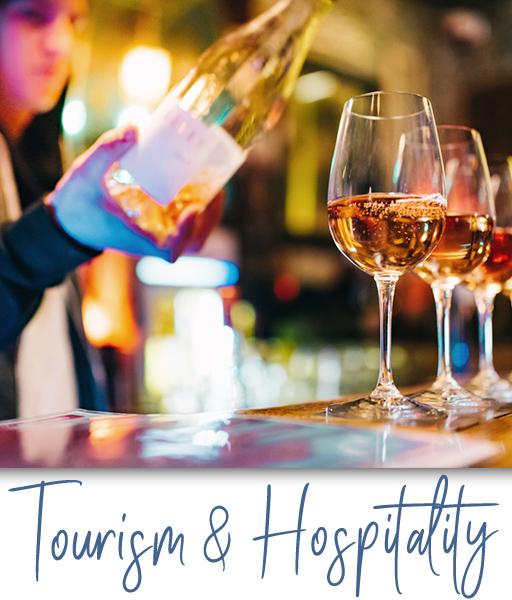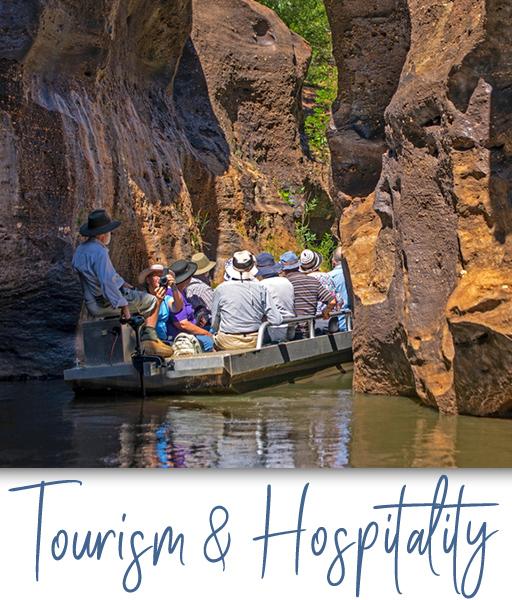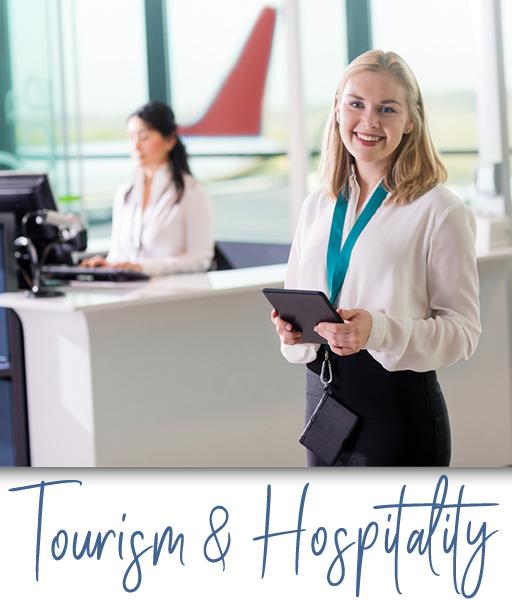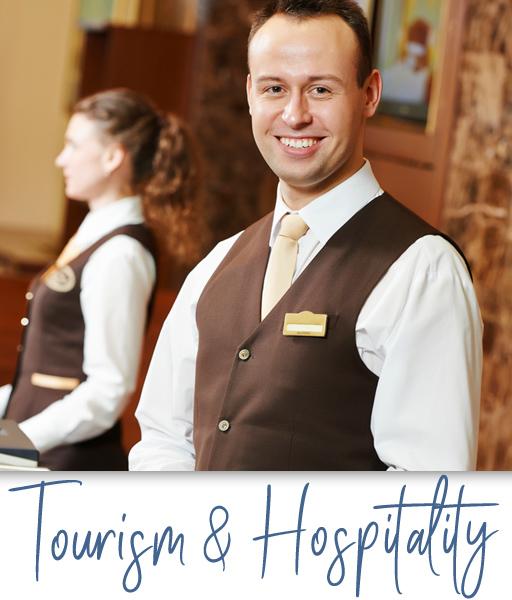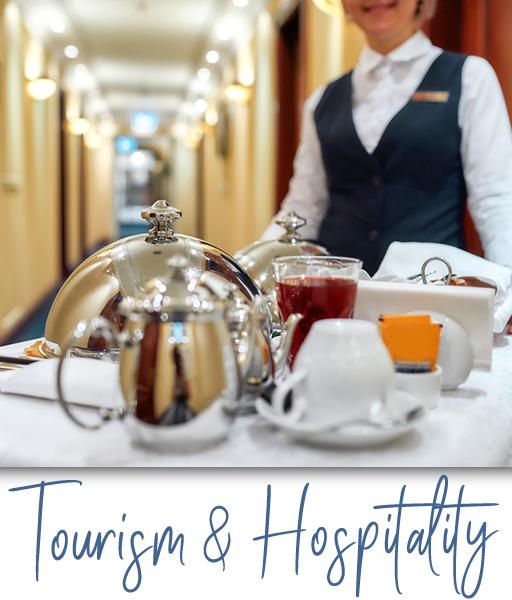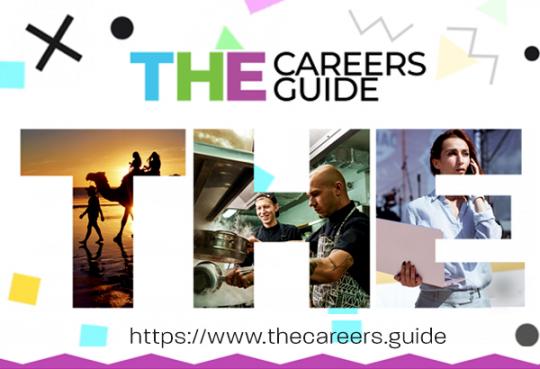A job to love
How would you like a career that can take you anywhere in the world, in a service industry that employs almost one million people in Australia, in over 300,000 businesses1? Tourism and hospitality can offer you that, and so much more!
Take a look at this short video from Tourism WA, which features tour operators and accommodation managers talking about their passion for tourism and hospitality and showcases some of our top attractions.
All this and more is waiting for you, in WA's tourism and hospitality industry! We live in one of the most beautiful places on earth, with an abundance of natural beauty, history and ancient Indigenous culture — that's why almost three million people from interstate and overseas came to visit last year. Each of those people went home with memories of unique experiences — our hospitality and tourism workforce is a big part of that, and you can be too.
As one tour operator says — "It doesn't really feel like a job, it just feels like every day is a great experience".
From working as a tour guide or travel agent through to being a barista or qualified chef, mixing cocktails at a holiday resort or working in hotel operations or management; there's a wide range of occupations in tourism and hospitality, and fantastic opportunities to grow your career.
Although we are currently experiencing some downturn in tourism worldwide due to COVID-19 restrictions, which has a follow-on impact on hospitality businesses, the industry is forecast to bounce back and grow significantly over the next few years. Add to that new opportunities in areas such as eco and Indigenous tourism, sustainable food technologies and destination events and you could enjoy a career for life.
What tourism and hospitality can offer you
A career in tourism and hospitality has so much to offer — here's just a few reasons why it's a great industry to be in.
|
|
|
|
|
|
|
|
|
|
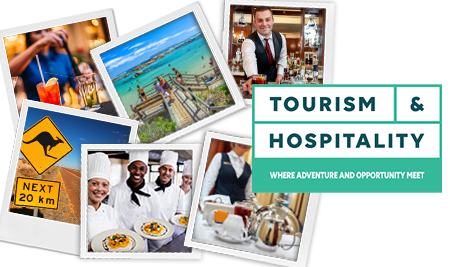
Start your adventure today!
Western Australia’s tourism and hospitality industry is your ticket to a career where adventure is always part of the job description and the opportunities are as vast as our sun-kissed state.
Find your tourism and hospitality job at westernaustralia.jobs. Dedicated to WA’s tourism and hospitality industry, the website is free and connects you directly with employers.
| Select one of the boxes below, or follow the individual links to find out more about the tourism and hospitality industry, the job and career opportunities each sector offers, and training and other options to get you started or further your career. |
|---|
How we can help
Jobs and Skills Centres are located across regional and metropolitan WA, and they can help with advice and support about all things jobs, careers and training.
An experienced careers specialist at your local JSC can help with all aspects of career planning and decision making, and offer information and support to help you choose the best pathway into working in tourism and hospitality.
All services are free!
Call your local JSC on 13 64 64, or find your nearest JSC via the link below and drop in for a chat.

Fast facts: About the tourism and hospitality industry
"Tourism and hospitality" is the term used to describe the overall industry, because the two sectors — tourism, and hospitality — are closely related. However; each offers different jobs and careers, and different types of work, so it's important to look at them separately when you're considering your future pathways.

The tourism industry incorporates businesses that provide goods or services related to leisure and business activities away from a person's usual home or business environment — generally, related to holidays and/or travel for business or pleasure. Tourism has two main areas — domestic (travel and tourism within Australia), and international (outside of Australia), and it's a multi-billion dollar global industry.
Tourism services include all aspects of travel and travel arrangements including bookings and itinerary, tour operation and guiding, visitor information centres, tourist attractions including landmark sites and adventure parks and also historical, cultural and/or eco experiences.

Hospitality is the business of making people feel welcome. It's has two main areas — accommodation, and food and beverage. These are generally categorised as "front of house" — the people you see, such as the hotel concierge or the maitre'd at a restaurant, and "back of house" — the people you generally don't see, such as the hotel's housekeeping team or the restaurant's kitchen staff.
Hospitality happens in a wide range of settings; from budget hostels or holiday parks to eco retreats or glamping or luxurious hotels and resorts; as well as cruise ships, restaurants, clubs, pubs, arenas and sporting venues, cafés or coffee shops, catering services and casinos.
A world of opportunities and experiences
Tourism and hospitality happens all over the world — on land, on water, and in the air. From hot air ballooning over the Avon Valley or helicopter rides over wineries in South West WA to restaurant service on an ocean liner touring islands in the South Pacific, working the front desk at a luxury resort on the Gold Coast to guiding tours at a wildlife sanctuary in Africa, it is truly an industry that can take you anywhere and offer you experiences like no other.
Although the industry can be exciting, and some may say even glamorous, it's important to remember it's a service-based industry and the focus is always on providing unforgettable experiences for the customer. If you love working with people — from business travellers to families — this could be the industry for you!
The travel and tourism sector
As of June 2020, Australia had over 318,000 tourism businesses — 1.2% more than at June 2019, which shows that tourism businesses continued to grow despite the challenges of COVID-19. Some sectors showed significant growth; such as travel agency and tour operator services (+55%). In WA, the tourism industry grew by 2.9% for 2019—20 to over 26,000 businesses5 and provided employment for 94,800 persons across WA3.
![]() In the year ending December 2020, we welcomed over nine million overnight visitors to WA — including 1.8 million from interstate and more than 950,000 from overseas3. The domestic market is our largest source of visitors and includes intrastate (people within WA) and interstate tourists. Add to this the 106 cruise ships that visited WA in 2019—20, which supported about 935 jobs either onboard providing hospitality services or onshore at one of WA’s 10 key ports4. In total, tourism activities in WA contributed $12.2 billion to our economy in 2020.
In the year ending December 2020, we welcomed over nine million overnight visitors to WA — including 1.8 million from interstate and more than 950,000 from overseas3. The domestic market is our largest source of visitors and includes intrastate (people within WA) and interstate tourists. Add to this the 106 cruise ships that visited WA in 2019—20, which supported about 935 jobs either onboard providing hospitality services or onshore at one of WA’s 10 key ports4. In total, tourism activities in WA contributed $12.2 billion to our economy in 2020.
In a year where international travel was significantly reduced, due to the closure of Australia’s international border on 20 March, we received over 220,000 international visitors who together spent over $541 million. Australia remains one of the world's top tourist destinations.
For outbound tourism, in 2019 Australian residents undertook 11,300,000 million international trips with New Zealand being the most popular destination; followed by Indonesia then the USA in third place.
The hospitality sector
The hospitality sector incorporates two key areas.
![]() Accommodation — facilities and services to visitors in hotels, serviced apartments, resorts, holiday parks, caravan parks and retreats.
Accommodation — facilities and services to visitors in hotels, serviced apartments, resorts, holiday parks, caravan parks and retreats.
This includes including front of house services such as concierge and reception, and back of house such as housekeeping, maintenance trades, gardens and landscaping, and technical support.
![]() Food and beverage — provision and/or supply of food and drinks for people.
Food and beverage — provision and/or supply of food and drinks for people.
This happens in a range of settings and venues including hotels, cruise ships, restaurants, cafes, clubs, pubs, bars and resorts as well as at events such as festivals or concerts and in facilities such as hospitals and schools, or through catering businesses.
The hospitality sector contributed $909 million to WA's economy in 2018—196. Nationally; restaurants, cafes and takeaway services alone contributed over $43 million to Australia's economy from March 2020 to March 20217.
The tourism and hospitality workforce
As of December 2020, the tourism industry in Australia employed 664,400 people (5.1% more than September 20206). This represents around five per cent of Australia's total workforce, making tourism one of our highest employers. Around 58% of these people work full time, and the workforce is around 66% male4.
For hospitality; in 2018-19, over 24,000 people were employed in food and beverage services in WA8 and nationally over 851,000 people are employed in the accommodation and food and beverage sectors9. These numbers are forecast to increase significantly over the next two to three years10.
Tourism and hospitality workers come from a diverse range of backgrounds and experiences. In general, this industry attracts people who are naturally oriented towards customer service, love meeting people, and genuinely enjoy making other people happy.
Cultural diversity is valued across the workforce, because many of your customers will be international travellers which makes a knowledge of other cultures and languages is a definite advantage in this industry. As the area of Indigenous tourism continues to grow, people from Aboriginal and Torres Strait Islander backgrounds are highly valued for their cultural knowledge and lived experience.
Some specialties within the industry tend to attract a particular demographic of workers — for example; tourism and hospitality associated with backpackers generally has a younger workforce. However; the industry offers opportunities for people of all ages and at all stages of life.
In tourism, around two-thirds of workers are male. Over 54 per cent of hospitality workers are female.
Tourism and hospitality offers a range of job and career opportunities — for entry-level workers through to high level management positions and everything in between. It's a great choice if you're looking for casual or short term work, but also a fantastic option for a lifelong career.
The kind of jobs you could get will depend on your skills and experience, and in some cases whether you have a qualification. Typically, experience is highly valued in the tourism and hospitality industry and many businesses promote from within in recognition of their employees' skills and experience.
Working in tourism or hospitality can truly take you anywhere in the world.
How would you like to be a tour guide in Paris, or on a wildlife safari in Africa? Closer to home, you could be working in one of WA's top hotels or restaurants, one of our many cafes or coffee shops, working on reception in an eco resort in Broome or as a venue and events manager at boutique winery and function centre in Margaret River. Or if you're really looking for something completely different, you could work on a cruise ship or potting whale sharks as a guide on a tour boat on the Ningaloo Reef!
The industry also encompasses transport services, camping and caravanning, attractions, and national parks.
In short, pretty much anywhere you go — whether it's in WA, around Australia or across the world — there will be something related to tourism or hospitality happening.
Many businesses in tourism and hospitality are small to medium size, but there's also plenty of opportunities in large businesses and even international corporations such as hotel chains and global amusement parks or similar venues.
Yes! In fact, it's an industry that has shown continual growth consistently over past years.
Forecasts for continued growth still remain; however COVID-19 has had a significant impact on the industry, particularly in the area of international tourism. Reduced visitor numbers have a flow-on affect to other areas of the industry — for example; hotel guest numbers reduce, visitor numbers are down for tourist destinations, and restaurants and bars are missing their international guests. In more positive news, tourism within Australia has picked up in 2021, due to the reopening of state borders, and this is giving the industry a much needed boost.
If you're not already in the tourism and hospitality industry, now is the perfect time to get into training and build your skills so that you're job ready to take advantage of all the opportunities that will come up once it returns to better times.
Tourism and hospitality is an industry where your skills and knowledge are highly transferrable, which puts you in a great position to switch jobs and/or progress your career. It offers much more than entry level work, and there's really no limit to how high you want to go.
For example; if you have experience as a bar attendant in a busy pub, that would transfer directly to another venue such as a casino or entertainment venue. Or if you're an experienced housekeeping attendant at a boutique hotel, your experience would transfer directly to a housekeeping role on a cruise ship or to move into a supervisory or management role.
Tourism and hospitality both offer excellent career paths, where you can either progress through to top level management or executive positions through gained skills and experience or undertake study to get you on the path to promotion.
To find out more, please explore the following sections.
The worldwide COVID-19 pandemic has had a significant impact on the hospitality and tourism industry, particularly in 2020. Border closures and travel restrictions limited domestic travel, and stopped virtually all international travel to Australia, and this led to a downturn in business across all areas of the industry as well as the loss of jobs in key business areas including airlines and hotels.
In 2021 domestic tourism and travel business is taking a positive upturn. In particular, intrastate travel and tourism (ie; within the state/territory) has increased significantly which is having a flow-on affect for our hospitality industry with business returning to restaurants, cafes and clubs. The WA State Government has invested heavily in promoting tourism within WA, and as part of its WA Recovery Plan is providing financial support to tourism and hospitality businesses to help them recover and rebuild.
We have been exploring our home state of WA at record levels so far in 2021, and travellers to WA from interstate are now increasing. Tourism operators are reporting an increase in visitors booking tours and experiences, and accommodation rates are also steadily improving. Many businesses have taken this time to diversity into other areas of tourism or hospitality, or to go in a new direction such as offering virtual tour experiences or offering home delivery services, and this opens up new opportunities.;
While the industry's recovery from COVID-19 will take time, these early signs show great promise for tourism and hospitality to continue growing in WA and across Australia, and eventually worldwide.
1 Source: ABS and Australian Government Department of Industry, Science, Energy and Resources
2 statistica.com Global tourism industry report May 2021
3 Tourism WA: Visitation to WA report (year ending Dec 2020)
4 Tourism Western Australia: Cruise shipping
5 Tourism Research Australia (Commonwealth Government)
6 Australian Bureau of Statistics Tourism Satellite Report December 2020
7 Australian Bureau of Statistics Retail Trade Report March 2021
8 Future Now Industry Training Council
10 Labour Market Information Portal, February 2021 quarter
11 Australian Industry and Skills Committee (AISC): National industry insights

Jobs and careers in tourism
The tourism industry offers something for everyone — a range of opportunities from entry level work through to high level management roles within Australia and across the world. If you enjoy meeting new people and trying new things, you’ll be amazed at the career choices available to you in this dynamic and exciting industry sector.
The type of job you pursue will depend on your career goals. Here's just a few things to consider.
- Are you looking for short term employment, perhaps on a casual or part time basis, or do you want to pursue promotion into a management career?
- Do you want to work front of house working directly with customers, or back of house in other areas of operations?
- Would you like to manage events such as conferences, trade shows and festivals?
- Is travel something you want, or are you happy staying here?
To help you answer some of these questions, and find the job that's right for you, here's an overview of some of the main jobs in tourism.
| Type of work | What you'll do | How to get there |
|---|
| Aboriginal tourism | Works in a range of job roles in the tourism industry, in organisations with an Indigenous focus, sharing knowledge of local Indigenous culture, cultural protocols with tourists. | Certificate I in Tourism (Australian Indigenous culture) |
| Attractions | Tourist attractions are popular all over the world, and offer a range of related jobs including visitor liaison, customer service, and guiding. |
There is no specific qualification for this role; however, a Certificate III in Travel or Certificate IV in Travel and Tourism offers a good starting point. |
| Caravan/ camping or holiday parks | There's a range of jobs available in this area of hospitality — from general customer service, through to management of a caravan or camping venue or holiday park, including housekeeping, grounds maintenance, or across different operational areas. | Complete a Certificate II, III or IV in Holiday Parks, or for management roles; a Diploma in Holiday Park and Resort Management. |
| Cabin crew |
Flight attendants and cabin crew are generally employed by an airline. They provide service to passengers in-flight, including the service of food and beverages, assist passengers with boarding and departing the aircraft, and work as part of a team to monitor safety and security to ensure that passengers have a safe and enjoyable flight. |
Certificate III in Aviation (Cabin Crew) |
| Commercial pilot (aeroplane) |
Commercial aeroplane pilots apply technical and non-technical aviation skills and knowledge to a wide range of air transport operations, including passenger, charter and cargo operations; with autonomy, judgement and defined responsibility in known or changing contexts and within broad but established parameters. |
Diploma of Aviation (Commercial Pilot Licence — Aeroplane) |
| Commercial pilot (helicopter) | Commercial helicopter pilots apply technical and non-technical aviation skills and knowledge to a wide range of air transport operations, including passenger, charter and cargo operations; with autonomy, judgement and defined responsibility in known or changing contexts and within broad but established parameters. |
Diploma of Aviation (Commercial Pilot Licence — Helicopter) |
| Communications, marketing, public relations |
This role utilises a range of marketing tools and techniques including market research and social media to market and promote tourism. This may be for a particular hotel or resort, or tour activity, for a particular region or area, or for tourism and hospitality in general. |
Certificate IV in Marketing and Communication |
| Cruise activities officer | This role provides fun and exciting activities for onboard guests and may host events such as trivia nights, exercise classes, quiz nights, exercise classes, demonstrations, dance lessons, and arts and crafts. The role is focused on providing a premium entertainment experience to make the cruise experience memorable for guests. | There is no specific qualification for this role; however, a Certificate III in Travel or Certificate IV in Travel and Tourism would be an advantage. A qualification in event organising would also be appropriate. |
| Cruise director | Oversees all passenger activities and entertainment on board a cruise ship. The most senior customer service provider of the ship's crew; the cruise director oversees the schedule of activities onboard and does a host of behind the scenes duties related to passenger safety and security and provides high level service to guests. | Generally, this role is reached through promotion from positions such as a cruise activities officer, or assistant cruise director and/or similar roles in tourism. A Certificate IV in Travel and Tourism or a qualification in people management would be useful. |
| Destination tourism | The key difference between destination and attraction in tourism is that a destination is an area which has some attractions and earns money from tourism, where an attraction is a place which attracts tourism. For example, the North West of WA is a destination, but a crocodile park in Broome is an attraction. | There is no specific qualification for this role; however, a Certificate III in Travel or Certificate IV in Travel and Tourism offers a good starting point. Knowledge of the destination area is key to this role. |
| Event organiser / planner | Manages and organises all aspects of events such as conferences and exhibitions, sporting events, trade shows and expos, concerts and festivals, product launches and promotions, and weddings, parties and other celebrations. Can lead to a role in events management. | A Certificate III in Events is designed for entry into this field, and the Diploma or Advanced Diploma of Event Management is for higher level roles. |
| Flight attendant | Flight attendants and cabin crew are generally employed by an airline. They provide service to passengers in-flight, including the service of food and beverages, assist passengers with boarding and departing the aircraft, and work as part of a team to monitor safety and security to ensure that passengers have a safe and enjoyable flight. | Certificate III in Aviation (Cabin Crew) |
| Housekeeping/ cleaner | Also known as a commercial housekeeper, or hotel room attendant. This role carries out services to ensure guests' rooms and the venue's facilities are clean and hygienic, including laundry services and room cleaning. | A Certificate II in Cleaning or Certificate III in Cleaning Operations would be highly regarded for this role, and may be a requirement for larger or more high end hotels and resorts. |
| Laundry operator |
All major hotels, and many smaller accommodation venues, have a large laundry operation with industrial equipment to launder towels, bedding and other items used by guests and/or staff. |
Certificate II in Laundry Operations |
| Leisure/ outdoor activity coordinator |
This role leads groups, including for tours, through leisure and/or outdoor activities such as snorkelling, kayaking, rock climbing, trekking, bush walking and recreational fishing. |
Certificate II in Outdoor Recreation Certificate III in Outdoor Leadership |
| Sales assistants | Promote tourism activities such as tours or events. Can also promote accommodation in order to bring business to a hotel, motel or resort or "upsell" guests on available services such as an in-house day spa. | There is no specific qualification for a sales assistant; however general customer service training and/or a background in tourism or hospitality would be an advantage. |
| Tour guide (arts) | This is a specialised tour guide role typically found in art galleries, museums, studios, theatres, entertainment venues or art and design retail outlets. The tour guide accompanies guests on tours, providing information and commentary and answering questions | Certificate III in Arts Administration |
| Tour guide (general) | Accompanies guests on tours, providing information and commentary and answering questions. Tour guides can operate in a range of places — from landmarks such as the Statue of Liberty in the USA or the Sydney Opera House through to historical sites, museums and art galleries, and even road tours via bus or train. Tours of Australia's key Indigenous cultural sites are increasing in popularity, as are eco tours of sites such as rainforests. |
Certificate III in Guiding
|
| Tour operator | Develops ideas for holiday experiences, and designs the itinerary and content. The tour operator arranges any services needed for the holiday; including accommodation, transport, tours and experiences, tour guides etc and then packages it as a holiday. They may also market and sell the holiday — either directly to the consumer or through a travel agent. | A qualification such as the Certificate II or III in Tourism, the Certificate III in Travel or Certificate IV in Travel and Tourism. |
| Travel consultant / agent | Generally works in a travel agency; assisting customers to decide on a travel destination and select a holiday experience, plan their itinerary, make the booking, and provide information such as visas, vaccines, and travel insurance. Most holidays sold are packages provided through a tour operator; however some travel agencies may develop their own packages in-house. Some agents specialise in a particular type of travel such as business, family, adventure etc, by destination, or by transport eg air, cruise or rail. | A Certificate III in Travel or Certificate IV in Travel and Tourism. |
| Visitor experience officer | This role is similar to a tour guide, but focuses more on a particular experience that may or may not include a tour component, or a specific venue. An example would be a VEO on a cruise ship or at a large resort. | Certificate III in Guiding Certificate IV in Guiding |
| Visitor information officer | Greets tourists and visitors to a particular destination or location, and provides advice and assistance such as directions for sightseeing or where to find accommodation. Visitor information officers may work in regional or country areas, or at a particular location or attraction such as a museum or art gallery, theme park or zoo. Sometimes this service is provided through a call centre, where advice and information is provided over the phone. May also be called a Tourism Advisor. | There is no specific qualification for a visitor information officer, however a qualification such as the Certificate II or III in Tourism, the Certificate III in Travel or Certificate III in Guiding would be useful. |
Please note: Some of these occupations will require you to hold a Responsible Service of Alcohol (RSA) certificate. A current First Aid certification would also be an advantage. Both of these can be completed through a TAFE college or private training provider.
The tourism industry also offers a range of operational roles such as working in finance, human resources, information communication and technologies. In larger tourism operations these jobs are part of the core business team, where in smaller businesses these services may be brought in on a contract basis or as needed. In the cruise ship sector, a large number of trades people and/or "behind the scenes" workers are employed and work onboard during the cruise.
For management positions, particularly in 'back of house', we encourage you to browse our course list to see a range of suitable qualifications. Many higher level and/or supervisory or management level positions in tourism are gained via promotion based on skills and experience; however gaining a qualification is a great way to improve your career prospects.
Spotlight on: Aboriginal tourism
WA’s rich, diverse and authentic Aboriginal culture gives us a unique point of difference over other holiday destinations. It's an important part of our tourism industry, offering people a unique insight into our rich cultural history. It's also an area of tourism that has grown significantly over recent years and continues to be more and more popular with both domestic and international visitors.
Tourism also enables Aboriginal people to work on country and create unique tourism experiences through sharing its history and beauty with the world.
If you are an Aboriginal person, this could be a fantastic career path to follow.
The WA State Government is making a significant investment to the future of Aboriginal and Indigenous tourism, including the launch of Tjina: WA Aboriginal Tourism Action Plan 2021—25 which is backed by a $20 million Aboriginal Tourism Fund. You can find out more on the Tourism WA website.
To find out more about Aboriginal tourism in WA, please visit the WA Indigenous Tourism Council (WAITOC) website.
Spotlight on: Eco tourism
Eco tourism, also known as sustainable tourism, is the fastest growing segment of the tourism market worldwide, driven by a desire to experience local cultures and natural habitats in a way that leaves minimal footprint on the environment.
So what is "eco tourism"? Eco Tourism Australia defines it as "ecologically sustainable tourism with a primary focus on experiencing natural areas that fosters environmental and cultural understanding, appreciation and conservation."
Eco tourism offers fantastic job opportunities if you're looking for something a bit different, and have an interest in sustainability and conservation. It is a fast growing area of tourism in Western Australia.
This short video features a look at how eco tourism is thriving in tropical North Queensland, and how it's contributing to the conservation and sustainability of this beautiful area and serving as a model for other areas of Australia to follow.
Spotlight on: Events
Event management is a significant part of the tourism industry. It can include gatherings for business, entertainment, sporting and leisure purposes for international and domestic visitors and include. These may include art exhibitions and shows, community events, concerts and performances, music festivals, food and wine promotions, weddings and parties, sporting events and competitions, business conferences and seminars, trade and consumer exhibitions, and promotions or product launches.
In this short video Kat, who recently completed her Diploma in Events Management at South Metropolitan TAFE, talks about what's involved in the job and what she learned in her training. She also shares some insights into how to get a job in events.
The events sector has been enjoying considerable growth over the past few years, due to the large number and various types of events and exhibitions taking place. It currently employs almost 39,000 people, and in great news for anyone considering a career in events employment projections predict a growth in employment to 46,900 by 202412.
This is an exciting area to work in, with fantastic job and career opportunities.
Explore tourism occupations
Because the tourism industry offers a range of different occupations and job roles, it's useful to explore these further so that you can decide on the kind of work you're interested in doing. We have over 550 occupation profiles you can browse through! To look for an occupation, use the keyword search option below, or visit our Occupation profiles page for other search options including an A—Z list.
Please note that the impact of COVID-19 is an unprecedented situation that will impact our ability to report accurate course information and employment trends at this time. Some employment trends and course availability information provided in occupation profiles may not be current.

Jobs and careers in hospitality
The hospitality industry offers a fantastic variety of jobs and careers across a range of workplaces. It truly has something for everyone — a range of opportunities from entry level work through to high level management roles within Australia and across the world. If you have a passion for customer service, love being part of a team and enjoy a bit of excitement in your work day, this could be the industry for you!
The type of job you pursue will depend on your career goals. Here's just a few things to consider.
- Are you looking for short term employment, perhaps on a casual or part time basis, or do you want to pursue promotion into a management career?
- Do you want to work front of house directly with customers, or back of house with more of a planning or organising role?
- Are you a foodie, or do you fancy yourself as more of a cocktail connoisseur?
- Is travel something you want, or are you happy staying here?
To help you answer some of these questions, and find the job that's right for you, here's an overview of some of the main jobs in hospitality.
| Type of work | What you'll do | How to get there |
|---|
| Baker |
Bakers produce a variety of breads, cakes, pastries, biscuits, rolls, scrolls, gateaux, tortes, pies, and slices. You will also learn first aid, food safety programs, hygiene, and workplace health and safety. |
Certificate III in Baking (pre-apprenticeship) |
| Bread baker |
Bread bakers specialise in making different types of bread such as sourdough, turkish bread, baguettes, continental loaves, panino, cobs, rye, ciabatta, focaccia, scrolls, rolls, and scones. |
Certificate III in Bread Baking (apprenticeship) |
| Cake/ pastry cook |
Specialises in cakes and pastries, sponges, biscuits, gateaux, tortes, filled pastries, and meringues. |
Certificate III in Cake and Pastry |
| Caterers |
Caterers use a range of cookery skills and knowledge of kitchen operations to prepare food items, generally to customer order for events such as conferences, expos, business lunches and dinners, or weddings and parties. They may also work in settings such as hospitals and aged care facilities, sporting and entertainment venues, hotel banqueting departments, cook–chill production kitchens, and mobile catering businesses such as food trucks. |
Certificate III in Catering Operations |
| Bar attendant | Bar attendants prepare and serve drinks to customers in liquor licensed premises such as bars, taverns, clubs, casinos, hotels and restaurants. They may also take care of customers’ orders in bar and dining spaces, clean and clear the bar, and restock fridges. Key aspects of this job are to provide friendly service and keep an eye on patrons’ consumption of alcohol to ensure they do not become intoxicated. Bar staff may also offer advice on wine and spirits, and some food service if the bar sells over the counter snacks or counter meals. | A Certificate II or III in Hospitality is ideal for an entry level role. |
| Bar manager | Manage all aspects of bar operations, including developing staff rosters and leading the bar attendants, oversee safety of the bar area, and complete financial reconciliations. They also work closely with the venue's security team, to ensure legal requirements are met. Bar managers are responsible for maintaining stock levels including ordering and purchasing of liquor, and maintaining security of the bar; in particular, monitoring patrons against over consumption of alcohol. | A Certificate IV in Hospitality, a Diploma of Hospitality Management or Advanced Diploma of Hospitality Management are all suitable for this position. |
| Barista | Baristas prepare, make and serve coffee-based drinks, generally in coffeehouses, cafes and restaurants. They operate and maintain industrial coffee machines, and work with a variety of ingredients to make specialist coffee blends. | A basic barista course is ideal for an entry level role, or Certificate II or III in Hospitality for advancement. |
| Butler | Butlers are generally found in high-end or boutique hotels and resorts. They provide personalised one-on-one service to guests, catering for their individual needs and preferences. | There is no formal qualification for butlering; however a Certificate II or III in Hospitality is good background. Experience in hospitality or in a role such as a concierge would be well regarded. |
| Cafe and restaurant managers | Oversee and manage all aspects of operations at a restaurant or cafe. For larger venues, more than one manager may be in place. | A Certificate IV in Hospitality, a Diploma of Hospitality Management or Advanced Diploma of Hospitality Management are all suitable for this position. |
| Chef | Manages the menu at a restaurant, cafe or similar venue including sourcing produce and setting prices. Prepares and cooks meals to either a set menu or for al a carte service. Chefs are trade qualified through completion of an apprenticeship. Qualified chefs may choose to specialise in a particular cuisine — and can further their career as an executive chef, head chef (chef de cuisine), sous chef (second in command), line or station chef (chef de partie) as they gain advanced skills in the areas of kitchen supervision, staff management, food preparation and cookery techniques through experience or further training. | A Certificate III or Certificate IV in Commercial Cookery, via an apprenticeship, is required for qualification as a chef. |
| Chef d'Patisserie |
A qualified chef who has undertaken specialist training to create pastries, cakes and other desserts — often in the French style. Generally only larger restaurants have a dedicated patisserie chef. |
A Certificate III in Patisserie qualification. |
| Commercial cook | A commercial cook does not require a formal chef qualification, but performs a similar role within a commercial kitchen such as in a restaurant, cafe or hotel. Commercial cooks focus more on food preparation and cooking, and are usually not involved in the development of menus or setting of prices. The style of food they cook is generally less complex than that in a high-end restaurant that requires qualified chefs. | A Certificate III in Commercial Cookery is ideal training for this role. |
| Club manager | Oversees all aspects of a club (including nightclubs) including developing staff rosters and leading the team, overseeing safety and security, and completing financial reconciliations. They also work closely with the venue's security team, to ensure legal requirements are met. | A Certificate IV in Hospitality, a Diploma of Hospitality Management or Advanced Diploma of Hospitality Management are all suitable for this position. |
| Concierge | Provides personal services and assistance to clients at hotels, hospitals, apartments, and in corporate buildings. They perform various tasks such as booking accommodation, taking messages, arranging transportation or organising entertainment. They also provide information about the local area such as restaurants, and deal with more complex guest issues. | There is no formal qualification for a concierge; however a Certificate II or III in Hospitality is good background. Experience in hospitality or in a role such as on hotel reception would be well regarded. |
| Food service manager | Generally found only at larger hotels or restaurants, a food service manager oversees all aspects of food service to ensure that customers enjoy their dining experience. | A Certificate IV in Hospitality, a Diploma of Hospitality Management or Advanced Diploma of Hospitality Management are all suitable for this position. |
| Holiday park/resort attendant | Assists customers with all aspects of their stay, and monitors the premises to identify any issues or concerns. This role is generally found in caravan parks or family resorts, or in locations such as holiday parks and national parks. | Complete a Certificate II, III or IV in Holiday Parks, or a general hospitality qualification. |
| Holiday park/resort manager — | Manages all aspects of the park or resort including leading the team of staff. This role is generally found in caravan parks or family resorts, or in locations such as national parks where camping is available. | A Certificate IV in Hospitality, a Diploma of Hospitality Management or Advanced Diploma of Hospitality Management are all suitable for this position. |
| Hotel/motel front office clerk | Greets customers, completes check in/out services including billing, assists with enquiries from hotel guests. Usually responsible for answering calls from guests with requests for room service, wake up calls etc. Also handles telephone and in-person enquiries from potential guests regarding bookings, prices etc. | There is no formal qualification for this role; however a Certificate II or III in Hospitality is good background. Business and/or administrative operations training would also be useful. |
| Hotel service supervisor | Generally found only in larger hotels and resorts, this role is responsible for all aspects of the services provided at the establishment. Generally there will be one or more supervisors for each area; for example, housekeeping or maintenance. | A Certificate IV in Hospitality, a Diploma of Hospitality Management or Advanced Diploma of Hospitality Management are all suitable for this position. |
| Hotel manager | Responsible for all aspects of the hotel, including management of staff and all facilities and services. Generally there will be one or more managers for each area; for example a guest services manager, an operations manager and an accommodations manager. | A Certificate IV in Hospitality, a Diploma of Hospitality Management or Advanced Diploma of Hospitality Management are all suitable for this position. |
| Kitchen hand | Assists the chef and his/her team with running the kitchen, and maintains the cleanliness and hygiene of the kitchen. This may include basic food preparation. | A Certificate II or Certificate III in Kitchen Operations is ideal for this role. |
| Maitre D' | The maitre d' (from the French "Maitre d'hotel" which literally means "master of the house") is the key person responsible for ensuring restaurant service runs smoothly and guests enjoy their experience. They oversee the service of food and beverages, greet restaurant guests, provide high level service, and handle issues or complaints. They also check reservations, greet guests and supervise the waiting staff. A maitre d' will usually have many years of experience in front of house service. | There is no formal qualification for this role; however a Certificate II or III in Hospitality is good background. |
| Mixologist | Mixes cocktails at a bar, either to a formal menu or ad-hoc as requested by customers. | A Certificate II or III in Hospitality for entry level bar skills, with specialist training in cocktail mixing and creation. |
| Porter | A porter greets guests on arrival to a hotel or resort, and transports their luggage to the room. At departure, the porter collects the guest's luggage from their room and organises it for transportation. In smaller hotels or resorts, the porter may also provide concierge services for guests. | There is no formal qualification for this role; however a Certificate II or III in Hospitality is good background. |
| Wait staff | Answer queries from (or provide advice to) restaurant or cafe customers regarding the menu and wine list, take orders, deliver meals to guests and clear the table. They may also take reservations for customers over the phone, via email or an electronic booking system, in addition to setting and arranging tables using correct linen, cutlery, crockery and glasses. Through experience, wait staff can progress to higher level positions such as head waiter. | A Certificate II or III in Hospitality is ideal for this role. |
Please note: Many of these occupations will require you to hold a Responsible Service of Alcohol (RSA) certificate. A current First Aid certification would also be an advantage. Both of these can be completed through a TAFE college or private training provider.
The hospitality industry also offers a range of operational roles such as working in finance, human resources, information communication and technologies — behind the scenes of the establishment. In tourism operations these jobs are part of the core business team, where in smaller businesses these services may be brought in on a contract basis or as needed. In the cruise ship sector, a large number of trades people and/or "behind the scenes" workers are employed and work onboard during the cruise.
For management positions, we encourage you to browse our course list to see a range of suitable qualifications. Many higher level and/or supervisory or management level positions in hospitality are gained via promotion based on skills and experience; however gaining a qualification is a great way to improve your career prospects.
Spotlight on: Chefs
Did you know that there's currently a shortage of qualified chefs across Australia? Chefs are in high demand, as they are the key to the success of any restaurant or cafe. Smaller businesses may require only one single chef to work across all aspects of the kitchen, but in larger businesses such as hotels and restaurants brigades (teams) of cooks and chefs work together in specific areas. Although the work can be stressful at times, and the hours can be long, most chefs will tell you that the passion they have for food and the ability to share that passion every day with their kitchen team and their customers makes up for all of that. And a career as a chef can take you anywhere in the world!
One person who can vouch for that is Chris Malone, who decided to pursue his love of food through a chef apprenticeship where he was employed by Fraser's Restaurant in Perth and did his training at North Metropolitan TAFE.
After winning several awards including WA Young Chef of the Year and carving a reputation as one of Perth's most talented chefs, Chris was offered a position at the Michelin Star Eleven Madison Park in New York. He then worked as sous chef in the Davies and Brook restaurant at Claridge's London — one of England's most prestigious hotels — as part of a brigade of over 50 chefs in a very busy kitchen. His latest appointment is as head chef at the famous underwater restaurant Ossiano in Dubai, and he's only 25 years of age!
Take a look at this short video to hear Chris share his early story.
Explore hospitality occupations
Because the hospitality industry offers a range of different occupations and job roles, it's useful to explore these further so that you can decide on the kind of work you're interested in doing. We have over 550 occupation profiles you can browse through! To look for an occupation, use the keyword search option below, or visit our Occupation profiles page for other search options including an A—Z list.
Please note that the impact of COVID-19 is an unprecedented situation that will impact our ability to report accurate course information and employment trends at this time. Some employment trends and course availability information provided in occupation profiles may not be current.

Am I suited to this kind of work?
Working in tourism and hospitality, you will meet people from all walks of life and from all across the world. It's a high-energy and fast paced industry, where you'll often be on your feet most of the day and sometimes the hours can be long. You'll need to be OK with working under pressure, and to high standards.
It's also important to consider that working in tourism and hospitality will sometimes require you to work evenings and weekends (although these are generally rostered, so you won't always have to do these shifts), and because special times such as Valentine's Day, Christmas and New Year's Eve are peak busy periods for the industry you'll sometimes have to work at these times.
While these things may seem like disadvantages, they are balanced by the enjoyment and fulfilment you can get from working in tourism and hospitality — the people you meet, the team you'll work with, and experiences you'll enjoy and the opportunities you'll find are truly unique to this industry.
What skills would I need?
In addition to the technical skills and knowledge you'll gain through training, you will also need a range of other skills and values to help you be an effective tourism and hospitality worker — both for yourself, and for your customers and guests. The top skills that industry employers say they're looking for are as follows.

Select each of these skills areas below to find out more.
This is the most important skill set you can have! Tourism and hospitality is all about providing your customers and guests with an experience to remember... for all the right reasons. No request is ever too much, and no demand too difficult. Even if it's been a long day, or you're not in the best mood, the customer always comes first.
It's important to remember that even though you may have hundreds of customers, each customer only has one of you. Treating each customer as an individual, and paying attention to their needs, will make them feel valued and appreciated — which after all they should be... they are keeping you in a job! But it's more than that — you'll need to have a genuine interest in helping people, and in ensuring they are having a great experience.
Sometimes there will be issues, and even complaints, but if you remember that the customer comes first then you'll be able to deal with this is a positive way.
All of the qualifications you can do in both tourism and hospitality will include units on customer service, so this is a great way to pick up the skills you'll need. And then you'll further develop these skills through on the job experience and by observing the way others in your team provide service to their customers.
In almost all the jobs in tourism and hospitality, you'll be working as part of a team. Your team mates will be there to support you when things get stressful, or when there's an important job to do. When you're able to work as part of a high functioning and effective team, even the toughest jobs can become easier.
Teamwork isn't just about your own direct team — the people you work with every day — it's also about being part of the larger team, whether that's a team of hundreds in a big hotel, or a team of eight in a busy cafe. Understanding your role, and how your work supports and assists others to do their work, is a big part of working in a team.
Good teamwork skills mean you share the work and the credit for a job well done. You treat your team mates with respect and consideration, and support each other. You build rapport and trust with your team mates by showing them you're reliable, and doing your fair share of the work. You'll be listening, and talking, to people almost all day as you gather information and discuss options. You'll also be making reports and completing paperwork, which will require good writing skills. Some clients may have difficulty communicating their feelings, or talking about their mental health issues, which will call on your ability to ask the right questions.
Communication skills are something you'll use every day. Listening, asking questions, offering solutions, resolving issues and even just saying "hello, how are you" as a guest walks by — these are all reliant on your communication skills. Some of your customers or guests may not have English as their first language, so there can be communication barriers to overcome.
Cultural awareness is also a big part of your communication skills. With Australia being such a multicultural society, and in dealing with international visitors, you will have the opportunity to work with people from a range of cultures so it's important that you are aware of any particular nuances that should be observed. You may also work with Aboriginal and Torres Strait Islander people, who will have preferences about the way in which they interact with you. Cultural awareness can be learned through training, but also through experience. It's a valuable skill set that's highly regarded by employers.
Resilience is all about your ability to "bounce back" from difficult or challenging situations and experiences. This kind of work can be challenging and stressful at times, so it's important you're able to manage your stress levels and maintain a positive attitude. You may also experience challenging customers or guests who are argumentative, use offensive language, or show you disrespect, and it's important you don't take this personally (although of course, if someone ever crosses a boundary and/or is physically or verbally abusive to you, this should be reported).
Flexibility means that you're able to adapt to different or new situations, and changes or disruptions to plans, and remain focused on the job at hand. For example; what if you were expecting a bus load of 40 tourists to arrive at 2 pm, but instead they show up at 12.30 and you're not ready? You'll have to think quickly, and be flexible enough to come up with a solution for the situation — for example; offer them a free drink in the lounge to buy yourself enough time to grab a team mate and complete the work you need to do. Flexibility is also part of working as a team — for example; if one of your team mates calls in sick at the last minute and your manager asks if you can cover their shift.
For your customers and guests to have a positive experience, things need to work like a well oiled machine. That requires everyone to be organised and able to manage their time so that tasks are completed as expected and to required standards. It only takes one person to be disorganised to put extra pressure on the rest of the team, which can result in unnecessarily challenging situations and potentially even conflict.
Managing your time involves setting priorities, and knowing how long individual tasks will take to complete. It also means being on time, and being where you're supposed to be at the right time.
Mental health issues affect everyone in our community; all races, all backgrounds. With Australia being such a multicultural society, you will most likely have the opportunity to work with people from a range of cultures so it's important that you are aware of any particular cultural nuances that should be observed.
You may also work with Aboriginal and Torres Strait Islander people, who will have preferences about the way in which they interact with you. They will also have a different style of story to tell, and their family and/or community context may be different to what you have experienced.
Cultural awareness can be learned through training, but also through experience. It's a valuable skill set that's highly regarded by employers.
Although customers and guests will remember their overall experience, it's the details that can make the difference between a good and an excellent experience. Remembering to put a chocolate on their pillow in the evening, or that they like an olive in their martini. Paying attention to things like the cleanliness of their room, or knowing that they get motion sickness and keeping an eye on them during a bus tour.
Many of the tasks you'll be doing in the industry are also very details focused — for example, if you're planning an itinerary for a family's holiday there could be many small details you'll need to pay attention to and consider.
If you have a genuine desire to help people and believe this kind of work would suit you, we encourage you to pursue your interests by talking to someone who works in the tourism and hospitality industry to ask about their experiences.
You can also get free careers advice from your local Jobs and Skills Centre — call 13 64 64.

How do I get a job in tourism and hospitality?
Now is a great time to consider a career in tourism and hospitality! Although COVID-19 has had an impact on the industry across Australia, there's still some fantastic opportunities out there — in fact, some businesses are as busy as ever and there's plenty of job vacancies waiting to be filled. Front of house hospitality workers such as bar staff, baristas, servers or waiters, kitchen stewards and floor supervisors are in high demand, as are tour operators and chefs. In tourism, there's a shortage of tour guides and travel agents, and in roles across a range of accommodation services such as those in hotels or resorts — particularly in regional areas.
As one of Australia's largest industries, tourism and hospitality offers job opportunities for people of all ages and all stages of life. Some entry level jobs may not require you to have a qualification, but some skills and experience will always be of value. Most importantly, you'll need to have a "can do" attitude and love working with people — tourism and hospitality is a very people-focused industry, and its success depends entirely on customer satisfaction.
Working in tourism and hospitality: Real stories
The Hilton chain of hotels is one of the largest in the world, and employs almost 200,000 people worldwide across over 6,000 properties, in a wide range of tourism and hospitality roles.
In this short video, Hilton employees talk about how they started in this industry, and their future career goals. There's also some great insights from managers about what they look for in their employees, and some top tips about how to get a job in tourism and hospitality.
You might also enjoy browsing Hilton's "Inside Look" series of videos, which give you an inside look at some of the key occupations within their business for an idea of what kind of jobs you might want to pursue.
Ready to start your job search?
Take a look at the following questions, to help get things started.
With such a range of jobs available, the first step is to decide what kind of work you would like to do. For example; do you want to work front of house — directly with customers? Or are you more interested in back of house — a less 'hands on' role?
If you're looking at travel and tourism, it would also be useful to consider what kind of work environment you would most enjoy. For example, does a large city hotel interest you? Or are you looking for something a bit less corporate — like a beachside resort, or guiding tours in the outback? Do you love food? Or do you think you'd like working with people to plan their holiday?
Finally, what level of work are you looking for? If you're starting with an entry-level position, you can expect to be working under supervision so that you can grow your skills and experience on the job. If you already have some experience in tourism and hospitality, perhaps you're looking for a job with more responsibility or you may want to get into a particular area such as hotel management.
Your answers to these questions will also help you determine whether you'll need to do some training, or get a qualification, for the job you want.
To learn more about jobs in tourism and hospitality, a good place to start is our occupational profiles but you can also take a look through the following websites.
- Take this quick career quiz to see what kind of role would suit you.
- View the occupation profiles on myfuture.edu,au (you'll need to register, but it's free!)
- Your Career: Occupation profiles search
If you're after a specific occupation or looking to make a career move then skilling up through training is the way to go.
Right now there's 180 qualifications with course fees reduced by half or more under the Lower fees, local skills program... and even better, there's an annual cap on course fees, so you can super size your study but only pay as little as $400 for the year if you are under 25 or looking for work!
There's also a number of free* short courses that will provide you with an excellent overview of what it's like to work in this field and get you job ready with entry level skills and knowledge, or on a pathway to further study.
Take a look at the Do you need to skill up? section for more information
*Free for eligible students
These are both great options to kickstart your career.
With a traineeship, you will complete a program of work and training over a period of time (generally one to two years). You are employed, and paid, during this time. You could choose to do a traineeship in healthcare or community services, to build your skills and knowledge, and then go on to a full traineeship or a qualification that will enable you to specialise mental health.
A pre-traineeship is a qualification that you complete at a TAFE college or private training provider, to give you some entry level skills and knowledge as a pathway to a full traineeship and employment
Take a look at the Do you need to skill up? section for more information
You can find out more about the industry, and about working in tourism and hospitality in WA, from the following websites.
- Tourism Western Australia is a government agency responsible for promoting WA tourism to the world
- Tourism Council WA is the peak body representing tourism businesses, industries and regions in Western Australia
- Business Events Perth markets WA nationally and internationally as a destination for conventions and exhibitions
- The Australian Hotels Association (AHA) WA represents more than 80 per cent of WA’s hotel and hospitality industry
- FutureNow is the WA industry training council that supports the tourism and hospitality industry
Because WA's aged care industry is rapidly growing, the demand for workers has never been higher! Most job opportunities are advertised online — here's some places to start your search.
There's also some companies who specialise in recruitment for the tourism and hospitality industry. We recommend doing an internet search to find out more about what services they offer for jobseekers. And if you're on social media, there's several groups on Facebook and Instagram that regularly post job opportunities — do a search to find them.
Top tip: Sometimes the best approach is a direct one — most of the major tourism and hospitality businesses operating in WA advertise job opportunities on their website, and/or their social media pages. Make a list of the companies you're interested in, and do an internet search to find them.
Remember, you can get free advice and information to help with job searching at your local Jobs and Skills Centre. Call your local JSC on 13 64 64 to find out how they can help.
If you’re interested in a career in tourism and/or hospitality, your local Jobs and Skills Centre can help with free advice on career planning and training to help you get there.
And if you've spotted a job you want to go for, they can help freshen up your CV and even help you put your job application together. Need some tips for job interviews? They can do that too!
Because Jobs and Skills Centres work closely with local employees and industries, they know where the jobs are and how you can get them. And they know what employers are looking for. There's 15 JSCs across Perth and regional WA, and all services are free. Call your local JSC on 13 64 64, or check our map to find your closest centre.
Find your job match, and explore careers
On the new Tourism, Hospitality and Events Careers Guide website, you can see what type of jobs match up with your personality.
- Are you an adventure seeker?
- Do you love meeting new people?
- Are you a storyteller?
- Is planning and organising your thing?
Find out what type of job could suit you, and see the study pathways that could get you where you want to be. Developed by FutureNow and Tourism WA, the website also features some great inspiration and advice from some of the industry’s go-getters and high achievers, sharing their career story.
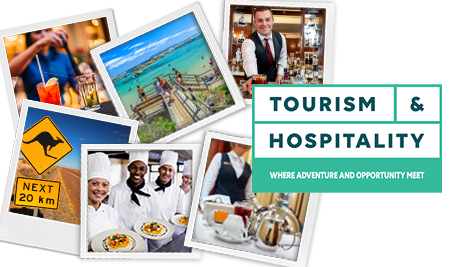
Start your adventure today!
Western Australia’s tourism and hospitality industry is your ticket to a career where adventure is always part of the job description and the opportunities are as vast as our sun-kissed state.
Find your tourism and hospitality job at westernaustralia.jobs. Dedicated to WA’s tourism and hospitality industry, the website is free and connects you directly with employers.

Do you need to skill up?
Training options and other pathways
When it comes to getting a job in tourism and hospitality, having skills and knowledge can really give you the edge over other jobseekers. There's a range of vocational education and training (VET) courses available at WA TAFEs and private training providers that can set you up to be job ready, with the skills and knowledge that employers are looking for. Or if you already have some skills and experience but would like a career change or promotion, a training course may be the way to get there.
Once you have identified the type of work you are interested in, and/or the occupation you're going for, you can find a course or qualification that offers the skills and knowledge you'll need to be job ready.
University study
If you are seeking a career in senior management, or in a specialist area of tourism, you could consider a university-level qualification. Each university will offer a different program of qualifications, at different levels and with different entry requirements, so it's worth taking the time to read through the information on their website to help decide which study pathway you want to pursue. You can find out more about universities in WA here.
Vocational education and training (VET)
With VET, there's a course or qualification for almost every job in tourism and hospitality! And there's never been a better time to get into training; with free courses and a range of qualifications with course fees reduced by half price through Lower fees, local skills!*
Free tourism and hospitality courses
Maybe you’re considering a career in tourism and hospitality, but not sure if it’s the right fit for you? Or maybe you’re interested to know more about what this kind of work would really be like? Or perhaps you just need to get some skills and knowledge together, to help you get that first job. Our free courses are the perfect choice!

We have worked closely with WA's leading tourism and hospitality industry representatives and employers to identify the types of skills needed right now and for future jobs, and developed free* skill sets (short courses). These courses provide an excellent introduction to working in tourism and hospitality, and can get you job ready skills for entry into the industry, and one of them even includes barista training plus your Responsible Service of Alcohol (RSA) certification!
- Commercial Kitchen
- Hospitality Service — includes barista training and your RSA
- Infection control (Food handling)
- Work in hospitality includes your RSA
 |
Select the Skill Sets icon on the course list to find out more about these free job ready skill sets |
*The infection control skill set is free for everybody. The other skill sets are free for eligible students — please visit our Skills Ready page for information about eligibility.
Half price tourism and hospitality qualifications
How would you like to get a nationally recognised and accredited qualification but pay only half-price course fees? Or even less than half price! And how about a fees cap? Eligible concession students will pay no more than $400 total for course fees in any one year*!
There's currently a range of qualifications available four tourism and hospitality — including events — with course fees reduced by half or more under the Lower fees, local skills program. These qualifications have all been chosen specifically to match up with the skills employers are looking for, and for where the jobs are!
*Please visit our Skills Ready page for information about eligibility for the annual course fees cap, and reduced course fees under Lower fees, local skills.

Other options to skill up and get that job
Getting a job without any relevant skills or experience is not easy... right? While the tourism and hospitality industry does offer a range of entry level jobs that don't require a qualification, you will be able to access a better range of job opportunities if you have some experience, skills and knowledge. That's where these other options can offer you a great pathway to skill up and get job ready.
Volunteering gives you the opportunity to become an active member of your community, while helping others and yourself. Many volunteering opportunities are available in tourism and hospitality — in particular; volunteer tour guiding.
Through volunteering, you can not only build your skills and knowledge but also gain valuable experience working with people. Volunteering is also an excellent way to network with organisations in your local area, and find out about job opportunities that are coming up.
If there's a particular person or organisation you would like to volunteer with, get in touch with them directly to see if they have any opportunities. You could also look at your local newspaper or community noticeboard, or check out an organisation that advertises volunteering vacancies on behalf of different organisations.
To find out more, visit the Volunteering WA website to see how you could get involved.
You can also contact your local Jobs and Skills Centre on 13 64 64 for assistance with finding a volunteering opportunity.
Work experience
Although generally unpaid, work experience can be a fantastic way to get hands-on practical experience in a particular field or occupation. Employers value skills and experience, so this can give you an advantage when looking for work.
Internships and cadetships
An internship or cadetship is work experience combined with on the job training while studying – similar to how people studying trades qualifications do an apprenticeship. An internship or cadetship can be done by secondary school students as well as those studying at college or university, and they're a great way to skill up.
Internships are generally short term, and are usually unpaid. They may lead to employment with the company but there’s no guarantee of this. An internship or cadetship is a great addition to your resumé.
Contact your local Jobs and Skills Centre on 13 64 64 for assistance with finding a work experience opportunity, or for advice and information about internships and cadetships.
These are designed to give you job ready skills and knowledge, and a 'taster' of working in a particular industry or job role. The training component of your pre-traineeship or pre-apprenticeship is based on nationally accredited vocational education and training (VET) units of competency, and on completion you will receive a nationally recognised Certificate II qualification.
This means that if you decide to grow your skills and knowledge through a higher level qualification after your pre-traineeship, you will receive credit for the units you have already completed so you can get that higher level qualification more quickly.
Pre-traineeships or pre-apprenticeships are available in a range of areas related to tourism and hospitality. Take a look at our course list to find out more.
Traineeships and apprenticeships combine training with on the job learning — you are employed for the duration, so you earn while you learn.
- A traineeship generally runs over one or two years, and is usually for a Certificate III or IV level qualification. Traineeships are in non-trade areas; including healthcare, community services, business and information technology.
- An apprenticeship generally runs over three or four years, and is usually for a Certificate III or IV level qualification. Apprenticeships are for trades areas such as building and construction, automotive, and hospitality.
On completion of your traineeship or apprenticeship, you will be awarded a nationally recognised qualification. There is no requirement to have completed a pre-traineeship/apprenticeship before starting a traineeship or apprenticeship; however, if you have already completed one you may receive credit for the units you have already achieved, which could shorten the time it takes to complete your traineeship or apprenticeship.
Some jobs in tourism and hospitality can only be gained through an apprenticeship — for example, a chef. You can contact your local Jobs and Skills Centre on 13 64 64 for information and advice about traineeships and apprenticeships, or take a look at our course list to find out more.
To do an apprenticeship or traineeship, you must be employed. So how do you find an employer?
- Call your local Jobs and Skills Centre on 13 64 64 for free information and advice — because they work with local businesses and employers, your local JSC knows where the jobs are!
- You can go out and find an employer yourself, by searching for advertised jobs or contacting a company directly.
- There are a number of Australian Apprenticeship Support Network (AASN) providers in WA that are funded by the Australian Government to provide advice and assistance to help you find an apprenticeship or traineeship and organise everything to get you started.
You can find out more on our Apprenticeships and traineeships page here
There's also some great information on the Australian Apprenticeships website about finding an apprenticeship or traineeship, including some useful tips for how to approach employers.
A school-based apprenticeship or traineeship (SBAT) is an employment-based vocational education and training (VET) learning pathway for secondary school (Years 11 and 12). It combines off the job training at a TAFE college or training provider, and paid on the job training through a work placement, that leads to a nationally recognised qualification and can count towards your WACE.
An SBAT is designed to give you skills and knowledge in your chosen field or while you're still at school, to give your career a head start. There's also the Aboriginal school-based apprenticeship/ traineeship program, for Aboriginal students in years 10, 11 and 12.
To find out more about SBATs, you can visit our Still at school page here, speak to your school, or call your local Jobs and Skills Centre on 13 64 64 for free information and advice.
SBATs are available in a range of areas related to tourism and hospitality, so this is a fantastic option if you're still at school and wanting to get a headstart on your career. You can see all of the qualifications currently available for SBATs here.
Contact your local Jobs and Skills Centre on 13 64 64 for information and advice about VET options while you're still at school.
Another option is to find a traineeship through a group training organisation (GTO).
GTOs employ apprentices and trainees across a range of different industries. You are directly employed by the GTO, but they 'host' you out to an employer for work. This can be a great option as you may have the opportunity to work with more than one employer during your apprenticeship or traineeship — giving you a wider range of experience. GTOs are experts in hiring apprentices and trainees, and are regulated to make sure they are doing the right thing by their employees.
Step 1: Register with a GTO
You can look through our list of WA GTOs here, and check their information to find what industry/sector and/or type of apprenticeship or traineeship they specialise in. The next step is to register with the GTO (you can register with as many as you like) so that they have your details if a suitable vacancy arises.
Step 2: Recruitment process
You will have an initial interview with the GTO, so that they can find out more about the type of apprenticeship or traineeship you're looking for and discuss options. If you are suitable, the GTO will either offer you an apprenticeship or traineeship or let you know when one becomes available.
When you start your apprenticeship or traineeship, your GTO will help you prepare to meet your host employer. They will also provide any pre-employment training that's required; such as workplace health and safety, and the basic personal protective equipment (PPE) needed for the role.
After you start your apprenticeship or traineeship, the GTO will assign you a field officer who will be your direct contact point if there's any issues or if you have any queries about your apprenticeship or traineeship. Your field officer will also monitor your training and work, and check in to make sure that everything is going smoothly.
All aspects of your apprenticeship or traineeship through a GTO are the same as any other apprenticeship or traineeship — it's really only the actual employment arrangements that are different; ie you are employed and paid by the GTO rather than by the company where you're doing the apprenticeship or traineeship.
Contact your local Jobs and Skills Centre on 13 64 64 for further information and advice about GTOs.

Tourism and hospitality courses
This course list details all of the courses and qualifications that are subsidised through Jobs and Skills WA for the tourism and hospitality industry. It includes free skill sets (short courses), and qualifications with course fees reduced through Lower Fees, Local Skills.
Using this course list
- Select one or more of the icons below, if you would like to search for free or reduced-fee courses.
- If you're looking for something specific, enter one or more keywords such as "travel agent" or ''chef"
- You can use the filter options to narrow your search by level of qualification, training provider, industry or specific study area
- To find out more about a course, select its title and then select a TAFE or training provider from the list presented
We have also included some courses in areas such as business and management that are not specific to this industry but may be of interest. If you would prefer to see just the tourism and hospitality courses, please select those options from the study area list.

Looking for advice on training, jobs or careers? We can help!
If you think the tourism and hospitality industry would be a great fit for your future, your local Jobs and Skills Centre can help with free advice on training and career planning to help you get there. And because they work closely with local employees and industries, they know where the jobs are and how to help you get them. Whether you need help freshening up your CV, writing a job application, or deciding what training course is the best option for you — your JSC can help!
JSCs are located through metropolitan Perth and regional WA, and outreach services are also available in regional areas. All services are free — just contact your local JSC to find out how they can help you.



